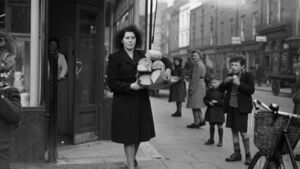A glimpse into a different, darker Ireland

For decades, Irish women were forced to live in a patriarchal society that saw no value for them away from the home. Picture: J. Merriman/Keystone Features/Getty Images
You couldn’t but be infuriated at the tale Ellen told on the documentary on RTÉ recently.
The programme examined the role women were prescribed to play in a different, less progressive Ireland for many decades, through the lens of the competition Housewife of the Year.
It interviewed different winners of the competition, sponsored for the most part by Calor Kosangas, to recount their lived experiences growing up in the Ireland of the time and the expectations of them in the home.
Listening to the interviews, you heard stories of unfulfilled potential, of women who were corralled by the norms of the time to live a life expected of them. Professional aspirations could take a jump. Birth control was a venial sin. Divorce was outlawed. The marriage bar meant women had to let go of public service jobs upon marriage. So generations of women were expected to simply be mothers to as many children as could be produced, stay at home and if that didn’t fulfill them, then tough.
It was a patriarchal Ireland where the power of the church was significant.
None of this is news but the perspective in those shows was striking. Here were women who were honoured as Ireland’s best housewives on an annual basis, the epitome of the model housewife, who, on the face of it at the time, were lauded as paragons. Yet when we hear them interviewed 30 and 40 years on, you see the reality of how they struggled with a life determined by society, and not themselves. Many of these women were trapped, victims of an oppressive, patriarchal society that saw no value for them away from the home.
The role of women in the home was constitutionally ‘protected’. Article 41.2 stated: "The State shall endeavour to ensure that mothers shall not be obliged by economic necessity to engage in labour to the neglect of their duties in the home."
It legitimised the containment of women. More than that, as Ellen recounted, the society of the time left so many lifelong scars.
We’ve all heard stories from that era of examples of how members of a so-called Christian church punished those who stepped out of whatever line certain bishops, priests, nuns and brothers decided to draw.
Ellen’s story was incredibly maddening, shocking at first but when you reflected upon it, not at all out of line with what we know to be true from that era. She told us how her father adored her and when she was 16, she was sick in hospital so her father bought her a camera. Not long after, herself and her friends were invited into a boat by some male friends in Youghal, Co Cork and they set off across the bay to Waterford.
The girls, as was expected of them at the time, were wearing long dresses and the boys, as is part of their make-up, started to mess, splashing them, ruffling their hair and dresses, and generally acting the maggots. Ellen had the camera and took photos of the high-jinks, the fun innocent teenagers were having on a warm day in 1960s' Ireland.
She went to the local pharmacist to get the photos developed – no smartphones or iClouds then! The pharmacist, obviously a self-appointed paragon of virtue, viewed the photos and saw fit to bring them to the local priest.
The priest confronted her parents and told them she should be sent to the Magdalens in Waterford. So her parents deposited her with the Magdalene Sisters. Her father, who had adored her, couldn’t even look her in the eye as he left.
It was heartbreaking to hear it. The parents’ agency cannot be completely dismissed but, at the same time, here was a father who had adored his daughter yet was under such a grip by the church that he didn’t even question what to do.
And over half a century later, Ellen’s memory and relationship with her father is defined by that moment, not all the love and adoration that preceded it. That’s the power the church had and frequently yielded.
Unfortunately, these examples are all too common. We’ve all heard of something similar, though not always as life-changing as what Ellen experienced.
I always recall my mother’s experience in the Convent of Mercy Secondary School in Castlebar in 1963, mere weeks after her mother died. Mam was just 13 at the time. Her father had the difficult task of raising three teenage girls on his own but it was one he performed admirably. However, a nun in the convent had a different opinion.
Mam came in one day with her homework incomplete. Given the recent loss of her mother, a bit of compassion and sympathy may have been in order but not for this cold-hearted nun. She marched my mother to the top of the class and told the students to ‘look at Mary Rose McGartland’, that her father wasn’t able to mind them and that ‘this is what happens when there isn’t a mother in the home’.
It was chilling and angers me bitterly every time I think of it. Not only was it a despicable thing to do to a grieving child but it was extremely instructive of certain mindsets at the time.
Not alone were women expected to stay at home but the counterpoint was that men were incapable of doing anything on the home front either.
My grandfather was, by all accounts, a very strong-willed man and upon being told what happened to my mother, marched up to the convent and told the nun in no uncertain terms what he thought of her and warned her never to single out his daughter like that again.
How widespread was such oppression? Those who lived through it can recall far better but it certainly appears to have been quite pervasive. The level of behaviour as outlined by Ellen often depended on who you were lucky enough or unfortunate enough to have as your local priest. Some were more progressive than others.
One Housewife of the Year winner, Ann, was married at 20 and by the age of 31 had 13 children, including four sets of twins. Whatever money they had was drank by her husband who retreated more and more to the pub as their flock grew.
Ann had to take a pot to a food centre and have it filled with stew, enduring the ignominy of bringing it home on the bus with judgmental glances. She entered the competition for the prize, £300 cash and a gas cooker, and won. But her life was not one to be lauded, she readily admitted. Yet that’s where we were as a society.
Gay Byrne was the host of the competition in its TV years (1982 to 1995) and while he is often celebrated as someone who brought Ireland towards modernity, clips from his time presenting reveal him as much a part of the problem as the solution.
“Are you a woman’s libber,” he asked one contestant dismissively.
Others were quizzed as to why there were gap years in the ages of their large number of children. The whole show Housewife of the Year was not just a product of a patriarchal society, it championed it and reinforced it.
However, when we reflect with horror on a different Ireland, we ought not to ignore the importance of domestic work and of raising children. Thankfully we live in a more progressive Ireland where there is much greater choice. Mothers, in theory, have the choice if they want to work or be stay-at-home parents. Men have the same choice too. But the reality is childcare is not as accessible or affordable as it ought to be to make this a proper choice for many parents.
Some cannot afford to stay at home while others cannot afford to work, depending on how costs may work out for them. We’ve come a long way but still have a journey to travel.





